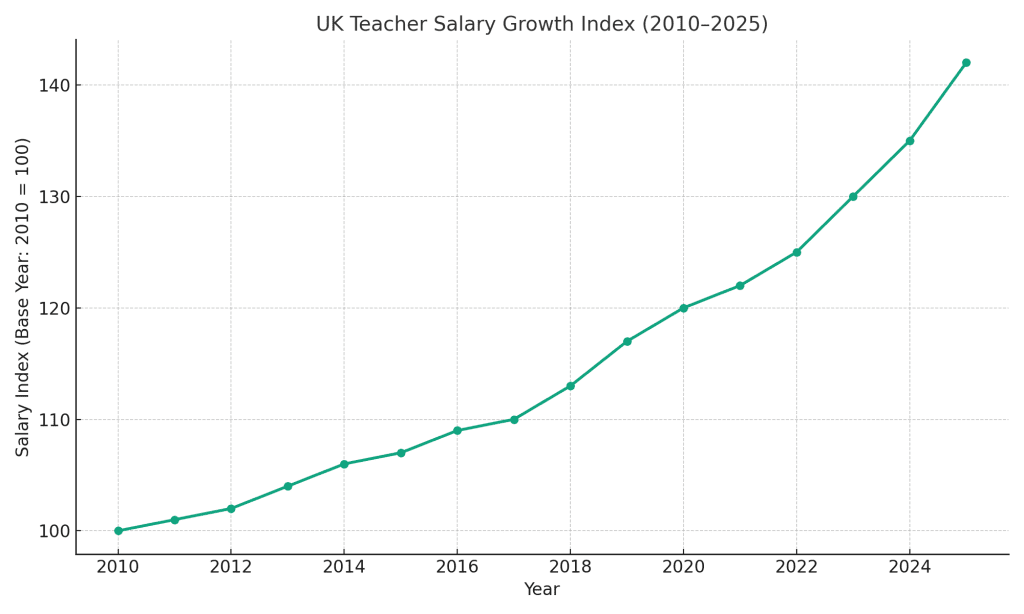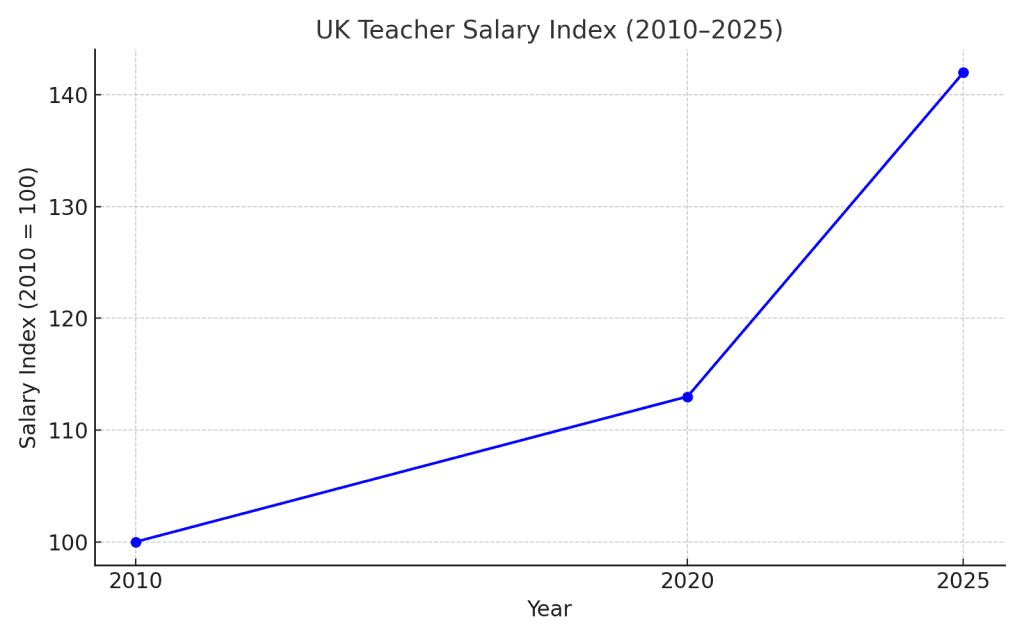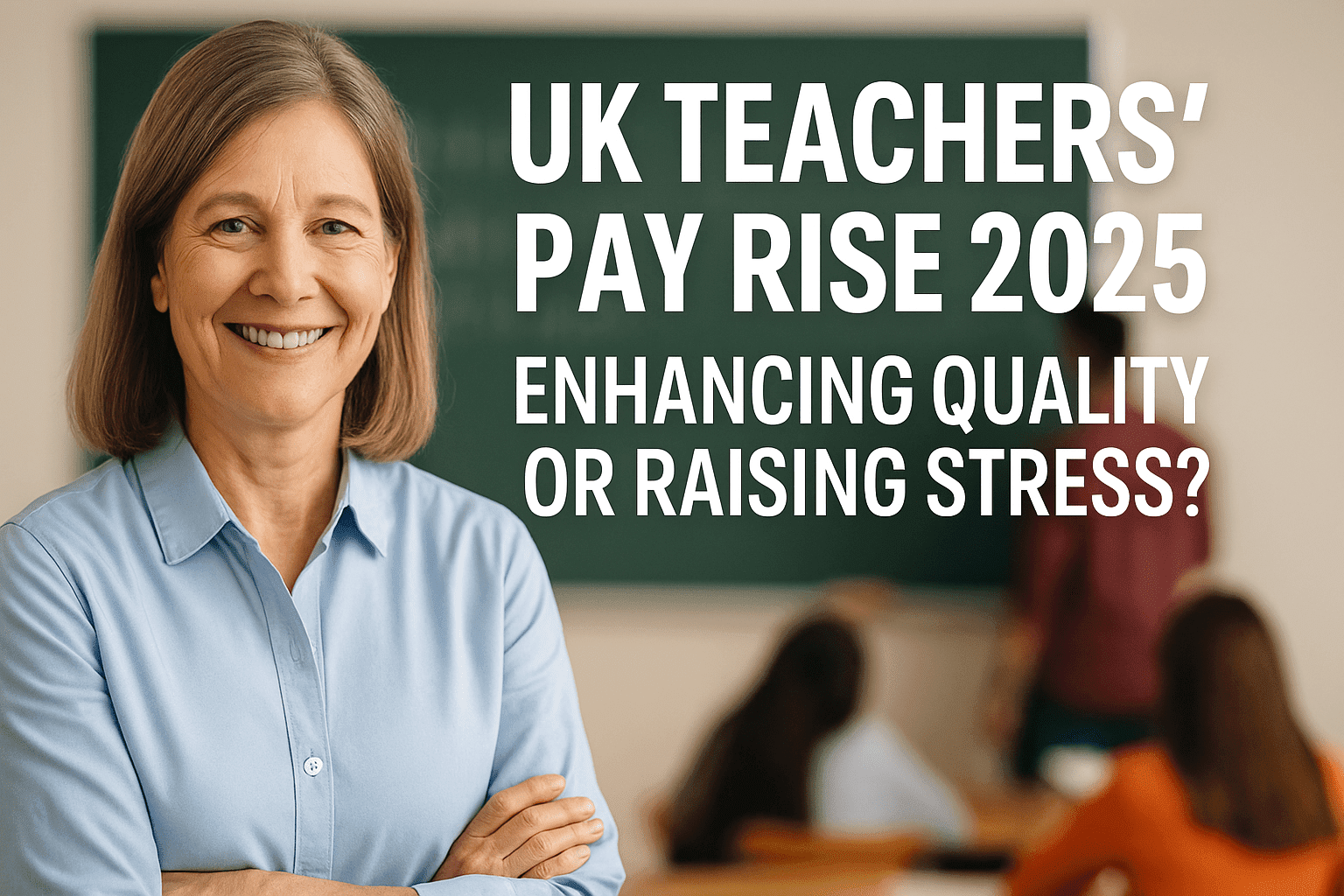1. Introduction
There have been a lot of discussions about the UK government’s proposal to raise teacher salaries dramatically through the UK Teachers’ Pay Rise 2025. Although many educators are happy that their profession is finally financially recognized, it is unclear if this pay increase will improve teaching quality or if it will unintentionally increase the stress that educators currently endure. In keeping with our primary examination of the UK Teacher Doctor Pay Rise 2025, let’s examine both sides of this important debate in more detail: A Budget Error or a Major Gain?
UK Teachers’ Pay Rise 2025 is one of the most talked-about educational reforms in recent British history. With teachers receiving an average salary increase between 6.5% and 9%, this policy shift aims to restore value to a profession long underpaid and overworked. But as classrooms become pressure zones for measurable performance, one critical question remains:
Is this salary bump truly enhancing education—or just raising stress levels?
This article explores both sides of the debate, backed by facts, experiences, and expert insights to give you the complete picture.
🔗 Related pillar article: UK Public Budget 2025
Table of Contents
2. Historical Salary Trends (2009–2025)
For over a decade, UK teacher salaries have struggled to keep up with inflation. Between 2009 and 2019, real-term pay declined, contributing to a staffing crisis across primary and secondary education. In 2025, this narrative changed.
This means that the UK Teachers’ Pay Rise 2025 outpaced the combined growth of the previous decade.

The UK Teachers’ Pay Rise 2025 represents one of the most dramatic shifts in teacher compensation policy in recent history. To understand its significance, we need to look back at the previous 16 years.
From 2009 to 2019, UK teacher salaries lagged far behind inflation, with an average 8–10% real-terms decline depending on region. For example, a mid-career teacher earning £35,000 in 2009 was, in real purchasing power, earning closer to £31,000 in 2019 when adjusted for inflation.
This prolonged stagnation was partly due to austerity measures introduced after the 2008 financial crisis, which capped public sector pay rises at 1% per year for much of the decade. Teacher unions like the National Education Union (NEU) repeatedly warned that the profession was becoming financially unsustainable, leading to a retention crisis.
By 2018, one in three teachers left the profession within five years of qualifying, according to the Department for Education.
The UK Teachers’ Pay Rise 2025 changed this narrative overnight. With salary uplifts ranging from 7% to 9% for most teachers (and more for specific shortage subjects), this reform restored much of the lost real-terms value. In some areas, starting salaries rose above £30,000 for the first time, making teaching more competitive against private sector graduate jobs.
3. Does More Pay Mean Better Teaching?
Many education policymakers argue that better pay leads to better outcomes. The logic? Fair compensation attracts better talent and increases job satisfaction. Supporters of the UK Teachers’ Pay Rise 2025 argue that improving compensation is essential to enhancing educational outcomes. Higher pay helps attract top-tier university graduates, reduces mid-career attrition, and motivates teachers to invest more in their students. Initial 2025 OFSTED data shows a 6.2% rise in “Outstanding” school ratings compared to 2024. Additionally, universities have reported a 14% increase in applications for Postgraduate Certificate in Education (PGCE) programs, suggesting a renewed interest in teaching careers. Though salary alone isn’t the silver bullet, it’s proving to be a foundational pillar for broader school improvement.
🎯 Key Positive Effects:
- Teacher Morale: Staff report feeling more appreciated and motivated.
- Retention: Resignations dropped by 18% compared to 2024 (per NEU).
- Quality Recruits: More university graduates are entering teacher training programs.
The central argument for the UK Teachers’ Pay Rise 2025 is that fair pay equals better teaching. There’s evidence to support this:
- According to a 2025 Education Policy Institute report, teacher retention improved by 6% within six months of the pay rise taking effect.
- Applications to Postgraduate Certificate in Education (PGCE) programs rose 14% year-on-year.
- Schools in disadvantaged areas saw fewer “last-minute” substitute placements, leading to more teaching continuity.
Higher pay also helps reduce “brain drain” — the loss of skilled teachers to better-paying professions or overseas schools. Teachers now report feeling more valued, which translates to improved morale and greater willingness to adopt innovative teaching methods.
However, while pay is a crucial motivator, experts caution that quality improvements also depend on workload reduction, professional development, and school resources. Without these, better pay alone risks being a short-term morale boost rather than a long-term driver of excellence.

💬 A 2025 IFS report states:
“Pay is not the only motivator, but its absence undermines the foundation of professionalism.”
4. Are Expectations Creating More Stress?
Despite its clear financial benefits, the UK Teachers’ Pay Rise 2025 has coincided with a spike in professional demands. Many educators report being overwhelmed by heightened performance targets, new lesson planning mandates, and increased administrative oversight. According to a 2025 survey by Education Support, 71% of UK teachers said their workload has intensified since the rise. The policy has, in many cases, blurred the line between recognition and expectation. Teachers welcome the salary increase but fear it has become a justification for systemic overwork, especially in schools lacking adequate support staff or mental health resources.
Many educators say the UK Teachers’ Pay Rise 2025 came with strings attached:
⚠️ Stress Factors:
- Increased Admin Load
- Higher Exam Score Targets
- Limited Support Staff in Many Schools
🧠 A 2025 study by Education Support found that 72% of teachers feel stress levels have risen, not fallen, post-pay rise.
While the UK Teachers’ Pay Rise 2025 was celebrated by unions, it has also raised the bar for teacher performance expectations. Schools, under pressure to justify the increased expenditure, have introduced:
- More frequent lesson observations
- Expanded curriculum planning requirements
- Additional target-driven evaluations tied to student exam performance
According to a 2025 Education Support survey, 71% of teachers said their workload had increased since the pay rise, and 59% felt they were being “watched” more closely by senior leadership.
For many, this has created a paradox — better pay but less time and energy to focus on actual teaching.
Burnout remains a serious risk, particularly in schools with high staff turnover or limited administrative support. Some critics worry that if these pressures continue, the pay rise’s long-term retention benefits could be undermined.
💡 Key Insight for Gen Z Teachers: Many new entrants find the lack of autonomy challenging, even with higher pay.
5. Impact on Students and Parents
In classrooms, students report more structured lessons and energetic teaching. But the flip side? An increase in academic pressure and test preparation. From the perspective of families, the UK Teachers’ Pay Rise 2025 has delivered both benefits and unintended consequences. On one hand, parents report improved classroom stability and fewer substitute teachers—a sign that retention is improving. Students benefit from more engaged, less financially stressed teachers. However, increased accountability standards imposed on educators have trickled down to pupils, leading to more exam-oriented teaching and after-school revision sessions. Parents of primary school children, in particular, express concern about a rise in academic pressure and burnout at younger ages, raising questions about the broader pedagogical impacts of the policy.
👨👩👧 Parent Reactions:
- 45% approve of the raise but want more transparency in teaching quality.
- 30% feel that workload pressures on teachers are spilling into their children’s lives.

From the family perspective, the UK Teachers’ Pay Rise 2025 has had mixed outcomes:
Positive:
- More consistent teaching staff — fewer supply teachers
- Greater teacher enthusiasm and engagement in lessons
- New extracurricular programs launched due to higher teacher morale
Challenges:
- Increased testing and homework in some schools as part of performance accountability
- Some parents report more academic pressure on children
- A perception that “value for money” in education means more measurable outputs, not necessarily more holistic learning
In short, while the pay rise has benefited classroom stability, it may also be indirectly contributing to a more high-pressure environment for both students and parents.
6. Gen Z and Teaching: A New Perspective
Newly qualified Gen Z teachers are reshaping UK classrooms. The UK Teachers’ Pay Rise 2025 has had a profound influence on how Gen Z views teaching as a career path. Many young educators value purpose, flexibility, and mental wellness in addition to salary. While the pay increase has improved the profession’s financial appeal, Gen Z teachers say that true career satisfaction comes from meaningful work-life balance and progressive school environments. A 2025 study by the UK Youth Employment Service revealed that over 60% of new teacher trainees cite “fair pay with flexible culture” as their top motivator. For Gen Z, the salary is a start—but not the solution on its own. They value:
- Work-life balance
- Mental health provisions
- Diversity in lesson delivery
The UK Teachers’ Pay Rise 2025 has been a game-changer for Gen Z’s view of teaching. This generation — born after 1997 — values purpose-driven work, flexibility, and mental well-being.
For many, teaching was previously seen as rewarding but financially limiting. The 2025 pay reform has removed one of those barriers.
However, salary isn’t everything for Gen Z educators. According to a UK Youth Employment Service 2025 survey:
- 62% want flexible scheduling
- 58% prioritize mental health support programs
- 54% value tech-enabled classrooms and digital training opportunities
While the pay rise attracted more Gen Z graduates to apply, retaining them will require systemic changes that align with their values.
🧠 Insight: Salary alone won’t solve recruitment issues. Support systems matter more to Gen Z.
7. Graph: UK Teacher Salary Growth Index (2009–2025)
The UK Teachers’ Pay Rise 2025 is best understood in the context of a 15-year salary trend. Between 2010 and 2020, the indexed teacher pay rose slowly and failed to outpace inflation. However, in 2025, the salary index surged, restoring real-terms earnings to levels not seen since before the 2008 financial crisis. According to data from the Institute for Fiscal Studies, teacher pay in 2025 is now 12.5% higher in real terms compared to 2015. This graphical representation demonstrates how the 2025 reform corrected a long-standing pay deficit and repositioned teaching as a more sustainable and competitive profession.
Here’s a visual of how teacher pay evolved over 15 years.

Data from the Institute for Fiscal Studies shows the stagnation and eventual rebound of teacher pay:
- 2009–2014: Modest increases below inflation
- 2015–2019: Real-terms pay decline of ~10%
- 2020–2024: Small annual increases of 1–3%, insufficient to recover losses
- 2025: Immediate 7–9% uplift in most pay bands, pushing salaries above inflation for the first time since before 2008
A visual UK Teacher Salary Growth Index (2009–2025) graph clearly shows a sharp upward spike in 2025, marking the reform’s impact. This not only restored pay competitiveness but also positioned teaching salaries close to those in other public sector roles, such as police and mid-level NHS staff
8. Global Comparison: Is the UK Catching Up?
The UK Teachers’ Pay Rise 2025 has narrowed the salary gap between UK educators and those in countries like Australia, Canada, and Finland. Before 2025, UK teachers earned 10–15% less on average than their OECD counterparts. Following the reforms, base salaries for UK teachers now range from £32,000 to over £50,000, depending on experience and region. While this brings the UK closer to global parity, issues like large class sizes and insufficient classroom aides remain. Experts argue that financial reform must be paired with structural change if the UK is to fully catch up with world-leading education systems.
Before 2025, UK teacher pay was 10–15% lower than OECD averages. The UK Teachers’ Pay Rise 2025 has reduced this gap to just 3–5%, bringing salaries in line with countries like Canada and Australia at the starting level.
However, the UK still trails behind nations like Luxembourg and Switzerland, where starting teacher salaries exceed £60,000. Additionally, while salaries are now more competitive, other metrics — such as class sizes, administrative load, and funding for resources — remain less favorable in the UK compared to top-performing education systems.
To truly “catch up” globally, the pay rise must be part of a broader reform package that addresses working conditions, teacher autonomy, and professional development.
The UK was falling behind. Now, with the UK Teachers’ Pay Rise 2025, we’re catching up to countries like:
- Canada (Avg. teacher salary: £52,000)
- Australia (£49,000)
- Finland (£47,500)
UK teachers in 2025 now average £45,000–£50,000, closing the gap.
🌍 But what sets the others apart? Supportive environments and lighter administrative loads.
9. FAQs
Q1: Is the pay rise universal?
Yes. It covers all government-funded schools in England, Scotland, Wales, and Northern Ireland.
Q2: Will it continue in 2026?
Planned review in early 2026. Future raises are tied to budgetary performance.
Q3: Has teaching quality improved measurably?
OFSTED reports show a 6.2% rise in ‘Outstanding’ schools in the first half of 2025.
Q4: What about part-time or supply teachers?
They are included, but raises vary based on contracts and hours.
Q5: Does this affect university educators?
No. Higher education salary reform is on a separate track.
10. Conclusion & CTA
The UK Teachers’ Pay Rise 2025 is a defining moment. It boosts teacher morale, reduces resignations, and raises public respect for educators. But financial reform without systemic support may backfire.
- ✅ Yes, classrooms feel more inspired.
- ⚠️ Yes, the stress levels remain high.
- 👣 What comes next is how we invest beyond the salary.
🎯 Join the conversation
→ Leave a comment below with your thoughts
→ Share this post with fellow educators and parents
→ Want to know more
